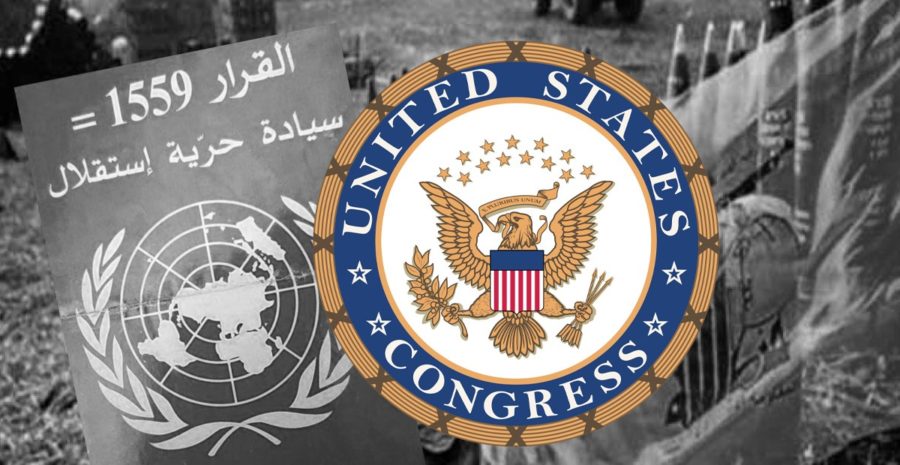
First remark: Lebanon is under Iranian occupation
The fate of Lebanon, as in any country, is determined by the balance of forces, the main component of which in a country under occupation or dominated by a militia is the military-security component. It precedes in importance the other components be it political, popular, economic, financial and cultural.
Hezbollah is the strongest party militarily and security wise, and as such, it vassalized the rogue political class and thus took control of all the units of the state apparatus, directly and/or indirectly. In this respect, it is worth of note that this corrupt political class power-shared these units via its mafia behavior based on an endemic political patronage.
After the election of General Michel Aoun to the Presidency of the Republic in 2016 and the 2018 parliamentary elections through which Hezbollah gained the majority, the strategic decision of any Government, irrespective of its composition and nature, remains in its hands. Thus, one can say that Hezbollah controls the three constitutional institutions.
Externally, the Vienna talks are going on so far without success, knowing that the two major issues of ballistic missiles and Iranian expansion in the region remain outside the scope of negotiations.
The “raison d’être” of the Islamic Republic of Iran which is a mixture of a state and a revolutionary entity, is the export of its revolution to the worldwide, starting from the Middle East through its jihadist army in the region, i.e. the Quds Brigade and the Axis of Resistance.
It is further worth of note that Hezbollah is the main component of the Brigade and the Axis, and its Secretary General, Sayyed Hassan Nasrallah is the undeclared leader of the two entities, thus succeeding to Qassem Soleimani.
Therefore, with the success or failure of the Vienna talks, the Islamic Republic of Iran cannot afford losing its “raison d’être” and abandon the export of its “Islamic Revolution” at any price, since, in so doing, the regime in Teheran will fall.
Conclusion: Lebanon is under Iranian occupation via Hezbollah regardless of the success of Vienna talks
Second remark: Constitutional processes in an occupied Lebanon
The “Lebanese state” is not only a failed state or a rogue state. Lebanon is living in a situation of non-state.
In Lebanon, the State of Institutions, the Constitution, and the Law are absent.
The virtual State is only a tool in the hands of Hezbollah.
Therefore, there is no way for national salvation and change through using constitutional processes (parliamentary and
presidential elections and the formation of governments).
Conclusion : Coexisting with the occupier and the rogue political class under its control in Parliament, Government, and dialogue bodies, would only benefit to Hezbollah.
Third remark: Elections, Hezbollah and the International Community
After the formation of the Mikati government, the Lebanese political scene went hysterical concerning the parliamentary elections to be held on May 15, portrayed by many political forces as an existential turning point.
The West called and is calling for its holding, camouflaging its true goals, through the need to produce a new political elite generated by the October 17 2019 uprising, as an alternative to the corrupt political class, in order to implement needed reforms.
Meanwhile, the West whose main goal is to normalize its relations with Iran in order to conclude illusory juicy deals with it, is now practicing a “realpolitik” approach concerning Hezbollah and its cronies.
Therefore, Lebanese political factions who are blindly sharing such complacent Western approach towards Iran at this stage is similar to what happened in the early nineties, when the West gave a free hand to Hafez El Assad in Lebanon. Whoever participated in the Syrian-Lebanese security system at that time, on the basis of practicing “realpolitik”, either ended his life as a martyr like Rafik Hariri, or as a convict pursuant to a suspended death sentence like Walid Jumblatt.
Let’s remember that the Syrian occupation didn’t end through elections or formation of Governments, but through a non-violent sovereigntist movement which faced a Lebanese State under occupation.
It began with the boycott of elections in 1992, took shape with Cornet Chehwan in 2001 and evolved into a massive popular movement in 14th of March 2005, mirroring the will of Lebanese people to free themselves from the Syrian occupation.
But all this popular build-up couldn’t deliver if a real change of the military balance of forces didn’t occur. The massive military American presence in Iraq and the Bush Administration ultimatum to Assad, coupled with the 1559 resolution and the paramount of the sovereigntist movement in 14th March 2005, caused the withdrawal of the Syrian army from Lebanon on the 26th of April 2005.
Unhappily, the catastrophic behavior of the March 14’s main components towards Hezbollah, permitted the replacement of the Syrian occupation by the Iranian occupation, and paved the way to the “somalization” of Lebanon.
The lesson to learn here is that Lebanon cannot be liberated by those who has been tested and who gave priority to their own power game over the attainment of national objectives. Their very nature cannot change and it will induce their very same behavior in the future.
Let’s remember also that the 14th March coalition did have the majority of the Parliament in 2005 and 2009 and yet couldn’t liberate Lebanon.
Conclusion: Holding elections under occupation only serves the occupation.
Fourth remark: The outcome of elections
Hezbollah together with the corrupt, murderous rogue political class operating under its control, albeit in different forms, possess strong elements in the electoral process which would allow them to be victorious.
Thus, there is no way for those struggling for sovereignty and change to win the majority.
Two weeks ahead of the scheduled elections, all indicates that Hezbollah will get again the majority of the Parliament. This is why the elections will be held, unless Hezbollah gets the feeling in the meantime that its chances to win a majority are at risk. In this case, it is easy for it to provoke indirectly a security problem which would render the election process impossible.
The International Community would then be facing a difficult choice between a parliamentary vacuum and hence the total collapse of the non-State or an extension of the term of the current Parliament. No doubt that it will choose the second option and impose it on the whole political class.
Conclusion: Hezbollah will maintain its parliamentary majority, whether elections were held or not, with a bonus in the first case which will provide it with a renewed legitimacy.
Waiting impatiently for the day after the elections to bring together all genuine potentialities in a movement calling for freeing Lebanon from the Iranian occupation and the rogue murderer corrupt political class.
General Conclusion:
The “Somalisation” of Lebanon would awaken dormant jihadist cells in the Syrian and Palestinian camps as well as in certain Lebanese sunny regions. Moreover, it would encourage illegal immigration which has already begun, to Europe in particular.
The Lebanese problem is therefore not intrinsically Lebanese.
Lebanon has become a ticking time bomb for security, stability and peace in the region and in the world.
A roadmap for the rescue of Lebanon would therefore be beneficial for regional and international security, stability and peace.
Roadmap for rescue
The roadmap we propose is as follows:
1) The implementation of a Security Council resolution placing resolutions 1559, 1680 and 1701 under chapter 7 and expanding the tasks of UNIFIL.
2) A Security Council Resolution placing Lebanon under an international mandate in accordance with Chapters 12 and 13 of the United Nations Charter or through the invocation of Human Rights to confront the criminal political class.
3) It is only after the cleansing of all state institutions of political clientelism and corruption and the stabilization of the situation in Lebanon within the framework of the aforementioned international supervision that the legislative elections could be held in accordance with a new electoral law. They would be followed by the presidential election and the formation of a government that would pave the way for the lifting of international tutelage and the recovery of Lebanon at all levels. The Mandatory Authorities should form a temporary Lebanese military-civilian Authority to do, under its supervision, “the big cleaning” of the state apparatus.
Result: Renewed confidence of the Lebanese people in the Lebanese State, as well as renewed confidence of the international and Arab community, and of the Lebanese diaspora in the Lebanese State, paving the way for a rapid recovery of Lebanon economically, financially, socially and culturally…

